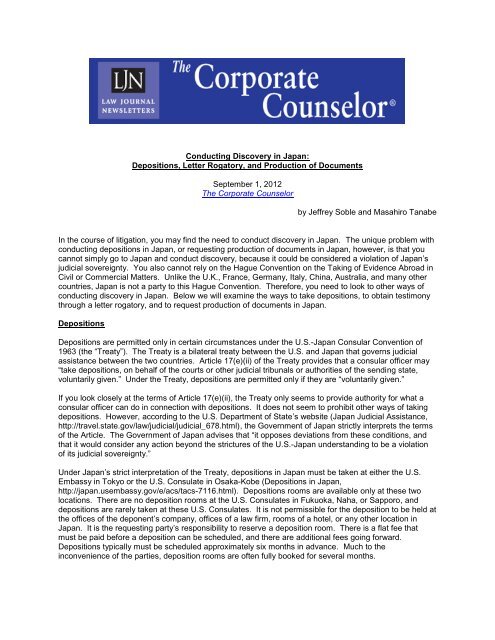Letters Rogatory Explained: Facilitating Legal Teamwork In Between Countries

Definition of Letters Rogatory
Letters rogatory are formal demands made by a court in one jurisdiction to a court in one more territory, seeking support in getting evidence or testament for a legal action. This step-by-step mechanism is important in the context of worldwide regulation, where legal systems might vary, and cross-border cooperation is necessary. Letters rogatory assist in the event of details that may be essential for adjudicating situations, especially in instances including complicated multinational problems.
Typically, these demands arise in civil, criminal, or administrative issues where a celebration needs evidence that lies outside the territory of the requesting court. The letters function as a way to guarantee that the concepts of due procedure are promoted, making it possible for courts to accessibility proof that may otherwise remain hard to reach as a result of legal or geographic obstacles.
The use of letters rogatory is controlled by global treaties, bilateral contracts, or residential legislations, which define the procedures and commitments of the courts included. It is essential to note that the execution of such demands is not assured; they depend upon the legislations and techniques of the territory obtaining the letter. Hence, letters rogatory are an essential tool for promoting legal collaboration and ensuring justice across boundaries.
The Process of Issuing Letters Rogatory
Issuing letters rogatory entails an organized procedure that ensures compliance with both global and residential legal criteria. Initially, the requesting event, generally a court or legal authority, prepares an official demand outlining the nature of the assistance looked for, the evidence or information needed, and the lawful basis for the demand. This document needs to be exact to help with understanding by the international jurisdiction.

The next step involves transmitting the letters rogatory to the designated foreign authority. This is typically done with diplomatic networks or worldwide lawful support structures, making certain that the demand is obtained and acknowledged by the international court. The foreign court then refines the request according to its very own lawful procedures, eventually reacting to the requesting event with the sought-after information or evidence, hence facilitating global lawful collaboration.
Importance in International Legislation
The importance of letters rogatory in global law can not be overemphasized, as you could try these out they work as an essential mechanism for judicial collaboration across boundaries. These official demands for help in legal matters allow courts in one jurisdiction to inquire, evidence, or the visibility of witnesses from another territory, consequently assisting in the administration of justice in multinational situations.
Letters rogatory are specifically crucial in the context of globalization, where legal disagreements frequently extend numerous countries. They make it possible for the collection of evidence that could or else be hard to reach, guaranteeing that legal proceedings are informed and fair. By cultivating cooperation between judicial systems, letters rogatory help maintain the regulation of regulation and advertise common regard among countries.
Moreover, the usage of letters rogatory shows a dedication to worldwide standards and concepts of participation, mirroring the interconnected nature of contemporary legal techniques. It highlights the relevance of adhering to well established procedures and treaties, such as the Hague Convention, which provides a structure for these requests - Letters rogatory. Eventually, letters rogatory improve the efficacy of lawful processes, making sure that justice is not hindered by geographical boundaries
Difficulties and Limitations
Despite their value, letters rogatory face a number of obstacles and limitations that can impede their performance. One main problem is the differing lawful frameworks and procedures across territories, which can cause misunderstandings and delays in the execution of demands. Various nations may have distinct needs for the credibility of letters rogatory, complicating the process additionally.
Furthermore, the commonly lengthy nature of global legal cooperation can hinder timely access to evidence or witnesses. This hold-up might negatively influence legal process or ongoing examinations, particularly in situations needing urgent activity. The absence of sources and training in some jurisdictions can result in inadequate handling of demands, leading to insufficient or incomplete feedbacks.
Nations with less formal lawful systems might struggle to abide with the step-by-step roughness expected in letters rogatory. These obstacles necessitate constant dialogue and reform to enhance the effectiveness of letters rogatory in lawful participation.
Study and Examples

Conversely, difficulties can develop, as seen in an instance involving a European country seeking proof in an ongoing criminal matter from a non-EU country - Letters rogatory. The procedure was postponed as a result of bureaucratic difficulties and varying lawful requirements, inevitably impeding the investigation
These instances highlight that while letters rogatory can help with worldwide participation and accelerate legal proceedings, they also highlight the need for clear communication and understanding of lawful structures in between countries. Such study underscore the visit this page importance of refining this device to boost efficiency and performance in global legal issues.
Conclusion
In summary, letters rogatory offer as a vital system for promoting lawful cooperation in between countries, making certain the collection of evidence and testament throughout jurisdictions. Their relevance in international regulation can not be overemphasized, as they advertise due procedure and boost the effectiveness of cross-border lawful procedures.
Letters rogatory are formal demands made by a court in one territory to a court in another jurisdiction, looking for help in getting proof or testimony for a legal case. The asking for event, generally a court or lawful authority, drafts a formal request detailing the nature of the help looked for, the proof or info needed, and the legal basis for the demand. The foreign court after that refines the demand according to its very own legal procedures, eventually responding to the requesting party with the desired details or proof, thus helping with international lawful cooperation.
Additionally, the use of letters rogatory shows a commitment to global standards and concepts of participation, mirroring the interconnected nature of modern lawful methods.International lawful collaboration through letters rogatory is not without its real-world ramifications, as illustrated by different case research studies that highlight both challenges and successes.